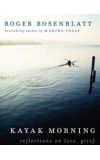
06 Jan 2012 03:42:54
"Kayak Morning: Reflections on Love, Grief, and Small Boats," was written after the essay was turned into a best-selling book. What he has discovered in the more than 2½ years since her death is that just getting on with life — captured in the closing image of the essay when his 23-month-old grandson asks for toast — hasn't worked. "What I failed to calculate is the pain that increases even as one gets on with it," he writes.
Rosenblatt has taken up kayaking, spending hours exploring the shoreline and eddies of the inlet near his other home in Quogue, a resort town on the south shore of Long Island, where his two sons, son-in-law and their families still gather every summer.
The book reads as an exploration of his eddying consciousness as he sets out one June morning on Penniman Creek while the rest of the family is asleep. He thinks about his highflying career as a journalist, when he traveled the world writing about other people's sadness. He meditates on the nature of water, wildlife and boats; recalls sorrowful passages of literature and poetry; and recounts conversations with a therapist friend trying to lift him out of his depression.
In one poignant passage, he simply imagines what it would have been like to be someone else, less lettered, less obviously successful, perhaps a high school teacher from a working-class town. Elsewhere, he converses with his daughter — "See here, Amy," he writes — and with God. He conjures her from memory and photos: on her wedding day; when she was 5 years old and danced on his shoes.
Eventually, he drifts and paddles his way toward a resolution of his anguish, a perspective that offers some peace of mind and lets him, again, get on with life. I won't reveal the epiphany that releases him from his torment. Suffice it to say, it won't come as a big surprise to anyone who has lost a loved one.

